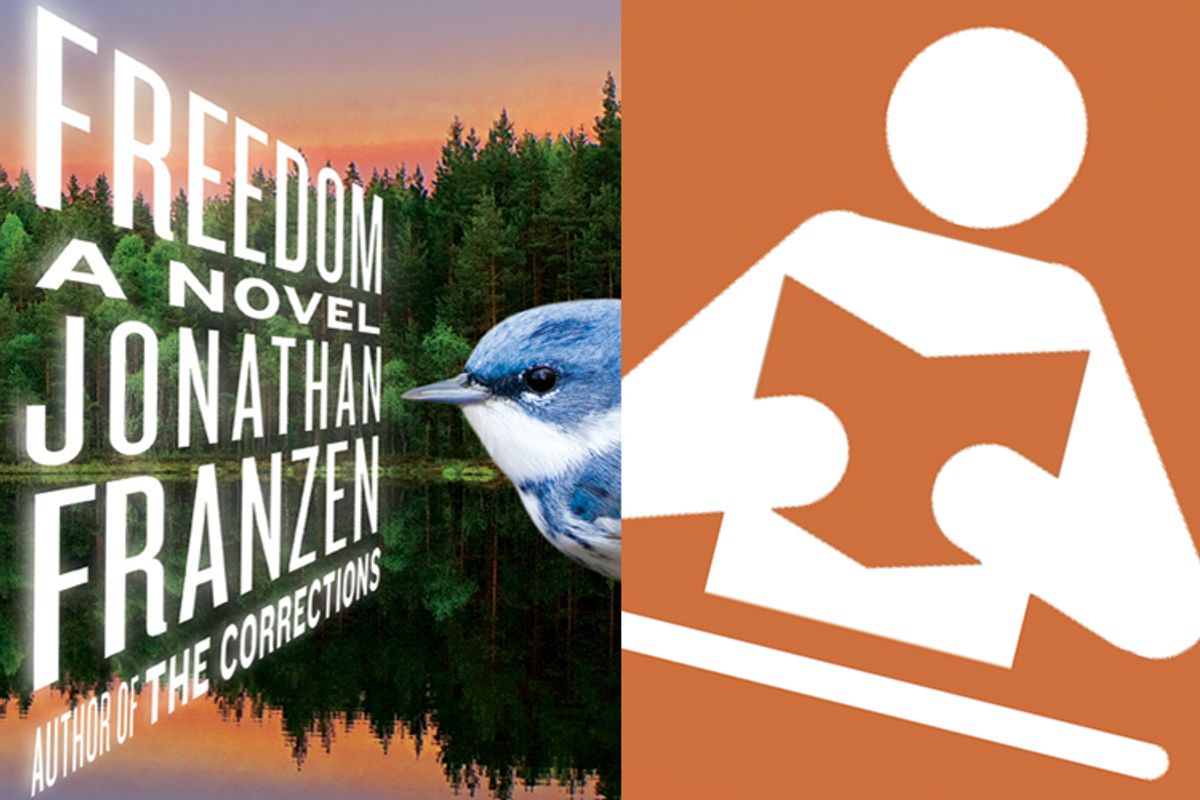Welcome to the first session of the Salon Reading Club, everyone! For those just joining us, we're going to be discussing Jonathan Franzen's new novel, "Freedom," for the next three Saturdays, beginning today with the first part of the book, "Good Neighbors," which takes us through the end of Patty's "autobiography" (Pages 1 through 187). Next Saturday, we'll consider half of the second part, "2004," reading through the end of the chapter titled "Enough Already" (Pages 191 to 382). On Sept. 18, we'll talk about the conclusion (See the sidebar to the right for more information on the Salon Reading Club.)
I'm going to kick off the discussion with a few questions and observations, but please feel free to take the conversation wherever you like in the comments thread. Just remember to restrain yourselves from discussing anything that happens after Page 187, so you don't spoil the story for everybody else. And it should go without saying that if you haven't gotten to Page 187 yet and don't want to be spoiled, then don't read any further. (Personally, I'm not the kind of reader who minds being tipped off to future plot points, so if you're like me, dive in.) And remember, if you have questions for Jonathan Franzen himself, don't forget to post them, since we'll be interviewing him at the end.
It may seem a tall order to ask that you polish off 187 pages of a literary novel in a week, but I, for one, found myself gobbling up Patty's autobiography. (Granted, I was on vacation, but it still took me all of two days.) One of the peculiar qualities of "Freedom" is how hard it is to summarize the novel's appeal. "It's about a marriage," I remember telling a friend before getting stuck. And that doesn't sound terribly exciting, I know. Nevertheless, I was completely entranced by this book.
I suspect that's one reason why the reviews for "Freedom" might strike some people as over the top; hyperbole is difficult to resist when a novel this low-concept has such a powerful effect. Why did I care so ardently about what Patty makes of her life? I suspect that the answer is because Franzen does, and he surpasses most other contemporary novelists in instilling that investment and that conviction in his readers.
Still, it wouldn't be a new Jonathan Franzen novel without the backlash -- the grousing from less-celebrated authors and from those perplexing individuals who are reflexively opposed to any fiction that's widely praised. To my mind, it's precisely because Franzen is able to impress critics and sell millions of books that he stirs up such kerfuffles; for an author with a reputation for sticking to old-fashioned realism, he's a stealth violator of conventional boundaries. Is anyone in the club finding it hard to approach "Freedom" without grappling with all this extraneous baggage?
As for our first selection, I was especially charmed by the decision to make Patty a jock. Such characters are pretty rare in literary fiction, and Franzen gets so much out of this aspect of her life. There's Patty's yearning to belong, perpetually rebuffed by her hypocritical family, and her mistrust of groups arising from the same source. It makes sense that anyone made so acutely aware, so young, of the conflicting interests in most human relationships would be drawn to the relatively clean, straightforward alliances of what she calls Jock World.
Yet Patty can't help but get entangled in one weird, ambivalent situation after another. Eliza, that borderline personality, zeroes in on her like a heat-seeking missile. (A terrific depiction of the bizarre, overwrought female friendship that often blossoms during the college years, there.) And that leads her directly into the novel's central triangle.
I happened to be reading "Freedom" while listening to an audiobook of Anthony Trollope's "Can You Forgive Her?" and despite Franzen's many allusions to "War and Peace," Trollope's was the 19th century novel I kept being reminded of while considering the Patty-Walter-Richard nexus. (Trollope was, after all, the author of "The Way We Live Now," a title that so many of Franzen's reviews have also referenced.) "Can You Forgive Her?" recounts two linked romantic triangles in which a young woman wavers between a man who seems "too good" -- that is, so moral and admirable that she feels extraneous and inadequate by comparison -- and his more alluring, bad-boy rival: much like Patty Berglund.
Several reviewers have linked the title "Freedom" to contemporary political trends and consumerism, but for me it's also about the often-made claim that the sort of long, realistic novel written in the 19th century can't speak to modern American life. Once, a woman could be destroyed by choosing the wrong husband, or by committing adultery, as Madame Bovary and Tess of the D'Urbervilles do. Now, people simply shrug and move on to another partnership.
Without those old social constraints, the argument goes, the stakes are too low in stories about contemporary courtship and marriage. We are simply too free for our everyday lives to matter as a subject for realistic fiction, and so the limitations of realism itself became the paramount subject. As the late, great experimental novelist W.G. Sebald once said of Jane Austen, "Given that you have a world where the rules are clear and where one knows where trespassing begins, then I think it is legitimate, within that context, to be a narrator who knows what the rules are and who knows the answers to certain questions. But I think these certainties have been taken from us in the course of history."
Franzen, it seems to me, is bent on proving that, even without those certainties, this kind of novel can still work, can still feel important. Over the next three weeks I hope we will discuss whether or not he succeeds.
OK, folks, have at it. Post your thoughts, questions, answers, predictions, complaints -- whatever -- in the comments thread.



Shares